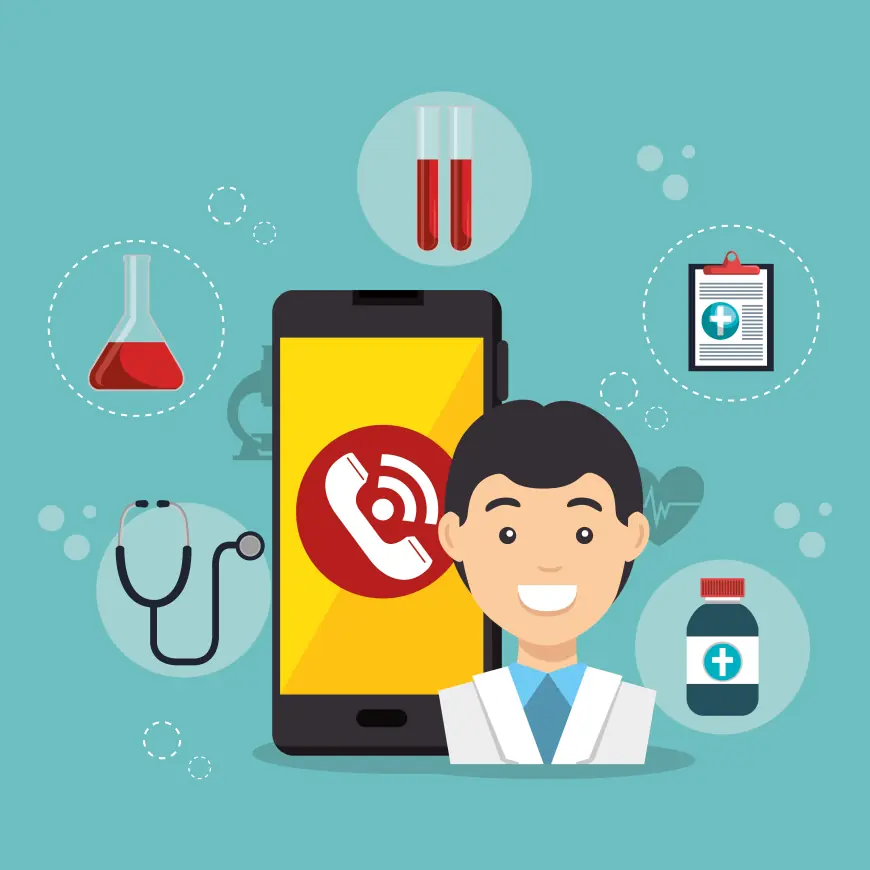How Medical Call Centers Support Healthcare Providers in Crisis Situations
This article examines the growing need for medical call centers during public health emergencies, explores how outsourcing companies improve response times, and discusses best practices for ensuring high-quality patient support in these critical times.
In times of crisis, whether during a public health emergency or any sudden surge in patient needs, effective communication and rapid response are crucial to ensuring that healthcare providers can deliver timely and quality care. Medical call centers have emerged as indispensable tools in such scenarios, providing critical support, streamlining communication, and enhancing overall operational efficiency. By leveraging the expertise of specialized medical call center outsourcing companies and advanced medical call center services, healthcare organizations can better navigate crises and improve patient outcomes. This article examines the growing need for medical call centers during public health emergencies, explores how outsourcing companies improve response times, and discusses best practices for ensuring high-quality patient support in these critical times.

The Growing Need for Medical Call Centers in Public Health Emergencies
Public health emergencies, such as pandemics, natural disasters, or sudden disease outbreaks, place unprecedented strain on healthcare systems. During such times, the demand for accurate, timely, and compassionate patient support skyrockets, and healthcare providers must be prepared to handle a dramatic increase in patient inquiries and care coordination needs.
Increased Patient Inquiries and Demand
In crisis situations, patients often experience heightened anxiety and uncertainty. They require immediate access to accurate information regarding treatment options, testing, vaccination, and the availability of medical resources. Medical call centers serve as a reliable conduit for information, ensuring that patients receive consistent and accurate guidance during times of chaos.
Overburdened Healthcare Facilities
Healthcare facilities in crisis are frequently overwhelmed by the volume of patients. In addition to clinical care, hospitals and clinics must manage administrative tasks such as appointment scheduling, triaging patient calls, and providing follow-up support. Medical call centers alleviate this pressure by handling the influx of non-clinical inquiries, allowing medical staff to concentrate on direct patient care. This delegation is essential for maintaining an organized and efficient healthcare response during emergencies.
Coordination and Communication Challenges
During public health crises, coordination among different healthcare providers, insurers, and public health agencies becomes crucial. Medical call centers offer a centralized platform to manage this communication, ensuring that all stakeholders have access to the latest information. This centralized approach enhances collaboration, reduces misinformation, and ultimately contributes to better patient care and resource allocation.
How Medical Call Center Outsourcing Companies Improve Response Times
When crises strike, every second counts. Medical call center outsourcing companies have developed strategies and technologies specifically designed to improve response times and handle high volumes of calls effectively.
Rapid Scalability and Resource Management
One of the primary advantages of outsourcing medical call center operations is scalability. Specialized outsourcing companies are equipped with flexible resources that can be rapidly deployed in response to surges in call volume. Whether it’s during a widespread infectious disease outbreak or a localized disaster, these companies can quickly scale up operations without the lengthy process of hiring and training additional in-house staff. This rapid scalability ensures that patient inquiries are addressed promptly, reducing wait times and alleviating patient anxiety.
Advanced Technology and Automation
Outsourced medical call centers leverage cutting-edge technologies such as automated call routing, interactive voice response (IVR) systems, and AI-powered chatbots to enhance response times. These technological solutions help triage incoming calls, ensuring that urgent inquiries are prioritized and routed to the appropriate specialist. Automation minimizes manual intervention, which in turn reduces the likelihood of errors and accelerates the overall process. With faster and more accurate responses, patients receive the support they need quickly, which is critical during emergencies.
Expertise in Crisis Management
Medical call center outsourcing companies specialize in handling high-pressure situations. Their agents are trained not only in routine customer support but also in crisis communication. This specialized training enables them to address sensitive situations with empathy and clarity, guiding patients through complex healthcare information and providing reassurance during times of uncertainty. The expertise of these teams is instrumental in maintaining high levels of patient satisfaction even under challenging circumstances.
24/7 Availability and Multilingual Support
Outsourced medical call centers are typically available around the clock, ensuring that patients have access to assistance at any time. This is particularly important during public health emergencies when patient inquiries can occur at all hours. Additionally, many outsourcing companies offer multilingual support, which is vital for serving diverse patient populations. The combination of 24/7 availability and multilingual capabilities ensures that every patient, regardless of language or time zone, receives timely and effective support.
Best Practices for Ensuring High-Quality Patient Support in Medical Call Centers
To maximize the benefits of medical call centers, healthcare organizations must adopt best practices that ensure high-quality patient support during crises. Implementing these strategies can lead to improved operational efficiency and a better overall patient experience.
Establish Clear Protocols and Workflows
Developing and maintaining clear protocols is essential for effective call center operations. Healthcare providers should work closely with their outsourcing partners to define standard operating procedures for handling patient inquiries during crises. These protocols should cover everything from call triage and escalation procedures to data security and compliance requirements. Clear workflows ensure that every call is handled efficiently and consistently, reducing the risk of miscommunication or delays.
Invest in Continuous Training
The success of any call center relies heavily on the skills and knowledge of its agents. Continuous training programs are vital to keep agents updated on the latest healthcare policies, technological tools, and customer service techniques. Regular training ensures that agents can provide accurate information and empathetic support, which is particularly important during high-stress situations. Additionally, training should emphasize crisis management and effective communication strategies to handle sensitive patient interactions.
Leverage Data Analytics for Performance Monitoring
Implementing advanced data analytics is key to understanding and improving call center performance. Healthcare organizations should work with their outsourcing partners to monitor key performance indicators (KPIs) such as average response time, first-call resolution rate, and patient satisfaction scores. Real-time analytics enable managers to identify bottlenecks, adjust workflows, and ensure that call center operations remain agile and responsive to changing conditions. Data-driven insights can also inform future improvements and help in making strategic decisions about resource allocation.
Focus on a Patient-Centric Approach
While technology and efficiency are important, the human element remains crucial in healthcare. Medical call centers must prioritize a patient-centric approach by ensuring that every interaction is handled with empathy and professionalism. Agents should be trained to listen actively, provide clear explanations, and offer personalized assistance tailored to each patient’s needs. A patient-centric approach not only improves satisfaction but also encourages loyalty and trust, essential elements for long-term success in healthcare.
Embrace Technological Innovations
The rapid evolution of technology continues to open new possibilities for medical call centers. Healthcare organizations should be proactive in adopting innovations such as AI-powered chatbots, advanced IVR systems, and cloud-based communication platforms. Embracing these technologies can further enhance response times, improve accuracy, and provide a more seamless patient experience. Providers should regularly assess emerging tools and trends to ensure their call center operations remain at the cutting edge of technology.
Foster Strong Partnerships with Outsourcing Providers
Selecting the right outsourcing partner is essential for maximizing the benefits of medical call centers. Healthcare organizations should establish strong, collaborative relationships with their outsourcing partners. Open communication, regular performance reviews, and joint problem-solving are critical to ensuring that the partnership evolves to meet changing needs. A strong partnership allows providers to align outsourcing services with their strategic goals, ensuring a seamless integration of operations.
Conclusion
Medical call centers are a critical component of modern healthcare, especially during crisis situations where rapid response and effective communication are paramount. By leveraging the expertise of medical call center outsourcing companies, healthcare providers can streamline operations, reduce administrative burdens, and improve patient satisfaction. Outsourced call centers offer 24/7 support, advanced technological solutions, and specialized crisis management capabilities that are essential for maintaining high-quality patient support in challenging times.
Implementing best practices—such as establishing clear protocols, investing in continuous training, leveraging data analytics, and fostering a patient-centric approach—ensures that call center operations remain efficient and responsive. As technology continues to evolve, innovations like AI-driven chatbots, omnichannel communication platforms, and cloud-based solutions will further enhance the capabilities of medical call centers.
For healthcare providers looking to improve their operational efficiency and patient care, partnering with a reliable and innovative medical call center outsourcing company is not just a strategic move—it’s a necessity. By embracing these outsourcing solutions, providers can focus on their core mission of delivering exceptional care while ensuring that every patient interaction is handled with the highest level of professionalism and efficiency.
What's Your Reaction?
 Like
0
Like
0
 Dislike
0
Dislike
0
 Love
0
Love
0
 Funny
0
Funny
0
 Angry
0
Angry
0
 Sad
0
Sad
0
 Wow
0
Wow
0















































